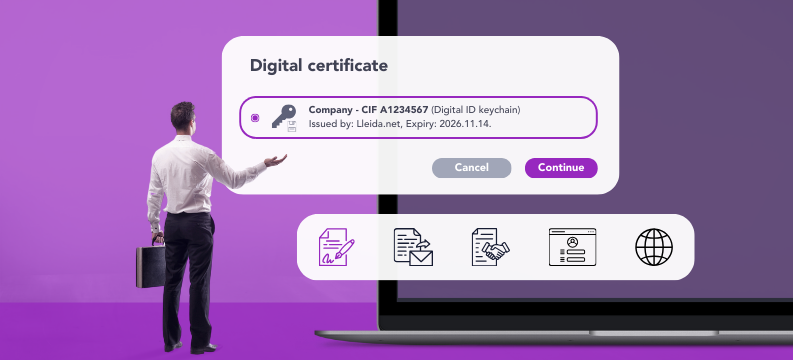Documentary evidence of sending and receiving
Electronic notification
Pay per use. No registration fees. No expiration date.
As simple as sending an email.
Sign documents and contracts
Our locations We are global
Lleida
Madrid
Paris
London
Miami
Dubai
San José
Bogotá
São Paulo
Tokyo
Santo Domingo
Cape Town
Johannesburg
Montevideo
Santiago de Chile
Lima
Beirut
Ciudad de México

Our customers trust us
Case studies
We particularly loved the ease and agility of contracting the system and its credit-based use. In other words, you top up some credits and start working without too much training, without any specific software installation or technical complexity
Registered notification service has made possible to help in the internal operating processes of companies and in their digital transformation.
Lleida.net gives us peace of mind and guarantees that parents verify the engagement of our services in a simple safely and legally way.
Connectaclik Pro has provided Holaluz with effective and customized solutions,a must have for any services we will add to our processes.
“Thanks to this agreement we would provide security, reliability and efficiency to our users. Being a technological platform it is crucial to offer the highest quality and the greatest attention to our customers”











News, interviews, tutorials
Blog

 11 December, 2024
11 December, 2024
Guest Registration in Spain: Compliance with Royal Decree 933/2021
Guest registration in Spain is an essential process for all businesses in the tourism sector. Ensuring guest registration in Spain is accurate and complies with the law is critical for businesses and authorities alike. The guest registration process is regulated by Royal Decree 933/2021, which mandates that all accommodations and platforms report detailed guest information. These regulations aim to enhance security and prevent criminal activities.
What does Royal Decree 933/2021 mean for guest registration?
Royal Decree 933/2021 requires companies in the tourism sector to collect and manage up to 42 different pieces of information per guest. This data must be transmitted to the Ses.Hospedajes system, managed by the Ministry of the Interior.
What information is required by Royal Decree 933/2021?
| Type of information | Example of data requested | Purpose according to the regulation |
|---|---|---|
| Personal Data | Name, surname, gender, ID document, nationality, date of birth. | Unambiguous identification of the guest. |
| Contact Information | Landline, mobile phone, email. | Communication in case of emergencies. |
| Booking Information | Number of guests, relationship (for minors), check-in/out dates, payment details. | Traceability of accommodation and booking process. |
| Additional Data | For vehicle rentals: GPS location, kilometres travelled. | Security and prevention of related crimes. |
Deadline for reporting data
The data must be reported within 24 hours and stored for three years for possible audits.
Who Does the Guest Registration Regulation Affect?
The regulation affects both companies and consumers in the tourism sector.
Companies Affected
- Tourism providers:
- Hotels, hostels, campsites, and any tourist accommodation.
- Intermediary platforms like Airbnb, Booking, or travel agencies.
- Transport companies:
- Vehicle rentals without a driver.
- Other activities related to tourist mobility.
Exceptions:
Private hosts conducting non-professional activities only need to report basic data.
Travellers
Every guest, whether travelling for leisure or business, must provide personal details. This includes:
- MICE Tourism (Meetings, Incentives, Conferences, and Exhibitions): For example, if a group travels to a congress like MWC in Barcelona, each member must provide their individual details. This includes minors, whose relationship with accompanying adults must be specified.
Objectives and Criticisms of Royal Decree 933/2021
Objectives of Royal Decree 933/2021
According to the Ministry of the Interior, the regulation aims to enhance national security by preventing crimes linked to terrorism and organized crime. The real-time traceability of guest data is a key measure to achieve this.
The system has reportedly helped locate over 18,584 individuals with outstanding police warrants since its introduction.
Criticism of the Regulation
- Administrative burden:
Manually managing 42 data points per client is challenging for high-turnover companies, especially during peak seasons. - GDPR concerns
Of the 42 data points, 23 involve personal or sensitive information. This raises concerns regarding data privacy and conflicts with GDPR’s principle of data minimisation, which requires that only necessary information be collected. - Economic impact:
Fines range from €100 to €30,000, adding pressure to a sector still recovering from the pandemic.
Operational Challenges for Guest Registration
- Time-consuming manual processes:
Manually collecting and verifying data can significantly extend check-in times, creating queues and diminishing guest satisfaction. - Incomplete data:
Some documents, such as certain international passports, may not include all the required information. - Technology adoption:
Transmitting data to the Ses.Hospedajes system requires technological upgrades, which can be particularly demanding for small businesses.
Practical solutions for guest registration: EKYC Onboarding
What is EKYC Onboarding?
EKYC (Electronic Know Your Customer) onboarding automates the real-time verification of customer data. It simplifies guest registration while ensuring full compliance with the law
Key advantages of EKYC Onboarding for guest registration
| Benefit | Description |
|---|---|
| Regulatory compliance | Ensures data collection and management according to Royal Decree 933/2021 and GDPR. |
| Streamlined check-in | Reduces wait times and enhances customer experience. |
| Scalability | Adaptable for both large hotel chains and small businesses. |
| Secure storage | Data is securely stored and available for audits for up to three years. |
Why choose Lleida.net?
Lleida.net offers an EKYC onboarding solution tailored for the tourism sector, ensuring compliance and efficiency.
Conclusion
Guest registration has become a regulatory challenge that requires efficient and digital-first solutions. With tools like Lleida.net’s EKYC onboarding, businesses can ensure compliance with Royal Decree 933/2021, streamline operations, and enhance the guest experience.
? Now’s the time to explore tools that simplify compliance processes. Contact us today for more information!

 28 November, 2024
28 November, 2024
What is a digital certificate, and why is it important for businesses
What is a digital certificate, and why is it important for businesses?
A digital certificate is a type of electronic ID used to confirm the identity of individuals or organisations online. It ensures that documents signed electronically are both genuine and legally valid.
As more businesses move towards digital solutions, the use of digital certificates is becoming a game changer in how contracts, agreements, and other important documents are handled. Companies are increasingly opting for digital tools that authenticate signatories and safeguard the integrity of the information being exchanged. Digital certificates are secure, fast, and fully compliant with international regulations, such as the eIDAS framework.
The main benefits of digital certificates over traditional paper documents
1. Time-saving document management
Managing physical paperwork means printing, signing, scanning, and mailing – a process that can take days.
With a digital certificate, you can sign and send contracts in just minutes, from anywhere.
2. Reduced operational costs
By going paperless, businesses can cut back on costs for paper, ink, and shipping. Plus, you’ll no longer need to store physical documents, which reduces storage costs.
3. Time-saving document management with digital certificates
Documents signed electronically are protected by encryption, making them tamper-proof. And with compliance to regulations like eIDAS and GDPR, these digital documents are legally valid across the EU.
4. Better traceability and control
Every step of the process—from sending to signing—is recorded and traceable. This provides transparency and can serve as legal proof in case of disputes.
5. Helping businesses become more sustainable
Switching to digital processes reduces your company’s environmental impact by cutting down on paper use and eliminating the need for physical document transportation.
Digital certificates and electronic invoicing: a must for compliance
Many small and medium-sized businesses (SMEs) don’t realise that digital certificates are essential for issuing legally recognised electronic invoices. In countries where electronic invoicing is mandatory (such as Spain, starting in 2025), having a legal entity certificate allows you to automate invoicing and stay compliant.
Why it matters:
- Avoid penalties for failing to meet tax requirements.
- Save time on administrative tasks.
- Streamline document exchange with clients and suppliers.
Digital certificates vs physical documents: A quick comparison
| Feature | Digital Certificate | Physical Documents |
|---|---|---|
| Time to manage | Minutes | Days or weeks |
| Operational costs | Low | High |
| Security | High, encrypted | Susceptible to fraud |
| Traceability | Complete, with detailed logs | Limited |
| Legal validity | Guaranteed by eIDAS | Varies by local laws |
Types of digital certificates for SMEs
SMEs can choose from different types of digital certificates, depending on their needs. Here are the most common ones:
Personal Certificates
These are used to verify the identity of an individual online.
Common uses:
- Signing employment or business contracts.
- Interacting with government agencies for tax filings or tenders.
Business Certificates
These represent a company, allowing it to perform official activities as an entity.
Common uses:
- Issuing legally valid electronic invoices.
- Signing contracts on behalf of the business.
Electronic Seal Certificates
These ensure the integrity of documents created by the company and are useful for automating processes.
Common uses:
- Automated notifications like order confirmations.
- Certifying documents such as legal agreements or insurance policies.
Server Certificates
These are linked to a specific device or platform, providing secure connections and data transfers.
Common uses:
- Securing websites with HTTPS.
- Protecting e-commerce platforms and client portals.
How to choose the right certificate for your business
The type of digital certificate you need depends on your company’s size, industry, and specific requirements. For example:
- If you interact with clients directly, personal or business certificates are essential for signing contracts and issuing invoices.
- If your company handles a large volume of communication, an electronic seal certificate will streamline operations and provide legal backing.
- If you run an online store or client portal, securing your platform with a server certificate is a must.
Success stories
1. E-commerce business: Gaining customer trust and boosting sales
The challenge: An online clothing retailer struggled with trust issues, as many customers hesitated to complete their purchases due to concerns about the security of their personal and payment information.
The solution: The company implemented a server certificate (HTTPS) to secure transactions and protect customer data. They also used certified email notifications to automatically confirm orders and shipments.
Results:
- Conversion rates increased by 25% due to the added trust from the secure browsing experience.
- Customer service inquiries about order status dropped by 30%.
2. Education business: Streamlining enrolment
The challenge: A language academy experienced delays in the enrolment process, as parents had to visit the office to sign contracts, limiting the academy’s capacity to meet growing demand.
The solution: They adopted an advanced e-signature solution, allowing parents to sign contracts remotely from any device. This system was integrated into their management software to automate contract distribution.
Results:
- Enrolment time dropped from 5 days to just 2 hours.
- Enrolments increased by 15%, thanks to the removal of logistical barriers.
3. Real estate agency: Simplifying rental contracts
The challenge: A real estate agency spent too much time managing rental contracts, including sending physical copies to tenants and storing them. This process was time-consuming and costly.
The solution: They implemented advanced e-signature tools to handle rental contracts digitally. They also used electronic seal certificates to validate these documents.
Results:
- Operational costs related to printing and mailing reduced by 50%.
- Deals were finalised in under 24 hours, improving the experience for landlords and tenants.
4. Logistics company: Improving delivery tracking and communication
The challenge: A logistics company needed a way to certify deliveries and resolve disputes with clients who claimed they hadn’t received their orders.
The solution: They used certified SMS and email notifications to keep customers informed about the status of their deliveries. Drivers also began digitally signing receipts upon delivery.
Results:
- Disputes related to delivery decreased by 40%.
- Customer satisfaction improved thanks to more transparent communication.
5. Creative agency: Quick contracts with international clients
The challenge: A graphic design agency faced challenges closing contracts with international clients due to time zone differences and the logistics of sending physical documents.
The solution: They implemented an advanced e-signature platform, allowing them to send, sign, and return contracts in minutes, regardless of location.
Results:
- Contract turnaround time was reduced from 7 days to less than 24 hours.
- International client acquisition increased by 20%.
Why Lleida.net is the best choice for digital certificates
Lleida.net is a recognised leader in trust services, offering:
- Certified notifications: Legally valid email and SMS notifications. Learn more on our Advanced E-Signature page.
- Advanced e-signature: Our Click & Sign platform for fast and secure document signing.
- Regulatory compliance: All our services comply with eIDAS and GDPR regulations.
We also have an international network covering over 15 countries and tailored solutions for sectors such as finance, telecommunications, and legal.
FAQs
Is it safe to use a digital certificate?
Yes, digital certificates use advanced encryption to ensure the authenticity and security of documents.
Can I use a digital certificate on my mobile device?
Yes, digital certificates are compatible with mobile phones, tablets, and computers.
Is it legally valid?
Yes, as long as it complies with eIDAS, it holds the same legal weight as a handwritten signature.
Digital certificates are essential for optimizing business management, enhancing security, and ensuring legal compliance.
Digital certificates make document management easier, secure your processes, and ensure legal compliance. Businesses of all sizes are adopting this technology to optimise their operations.
At Lleida.net, we’re here to help you embrace digital transformation.

 14 November, 2024
14 November, 2024
Automation for SMEs? Optimise your business with NOCODE, BPM, and BPMN
How Automation with NOCODE and BPM Can Revolutionize SMEs
Automation is no longer just for large corporations with big budgets. Today, small and medium-sized enterprises (SME) are adopting automation tools to streamline operations, reduce costs, and ensure compliance with regulations. The benefits are undeniable: faster processes, fewer errors, and greater employee satisfaction. With NOCODE and BPM solutions, Lleida.net empowers SMEs to simplify tasks and achieve more
This guide will take you through the key tools and strategies—like NOCODE platforms, Business Process Management (BPM), and Business Process Model and Notation (BPMN)—that can help your SME stay ahead of the curve. Let’s dive into how these solutions can transform your business step by step.
Why SMEs should embrace automation
Before diving into the specifics, it’s important to understand why automation is critical for SMEs. Unlike large companies, SMEs often operate with limited resources, making efficiency a top priority. Automation helps by:
- Reducing operational costs: Automating repetitive tasks saves both time and money.
- Ensuring compliance: Built-in tools like GDPR-compliant data logs reduce legal risks.
- Improving customer satisfaction: Faster response times and streamlined workflows lead to happier clients.
Now that we know the "why," let’s explore the "how."
Simplifying automation: what is NOCODE?
Technical Explanation
NOCODE platforms are designed to empower businesses by removing the need for programming knowledge. These tools use APIs and RESTful services to connect different applications, creating workflows that automate tasks like client communication, invoice generation, or data syncing between platforms. With features like audit trails and access control, NOCODE tools also support compliance with regulations like GDPR.
Practical Example
Imagine your SME frequently sends payment reminders to clients. Instead of manually tracking overdue invoices and sending emails, a NOCODE tool allows you to create an automated workflow. Using a drag-and-drop interface, you can configure the system to send reminders via email or SMS when payments are overdue, saving hours of administrative work.
This accessibility makes NOCODE platforms particularly valuable for SMEs, as they enable quick implementation without the need to hire a developer.
Streamlining workflows with BPM
A Holistic Approach
Business Process Management (BPM) takes automation to the next level by providing a structured methodology for improving workflows. BPM focuses on analysing current processes, identifying inefficiencies, and implementing improvements through three key stages:
- Analysis: Pinpointing bottlenecks and redundant steps.
- Modelling: Designing optimised workflows that align with business goals.
- Monitoring: Measuring the performance of new workflows and making adjustments as needed.
Why BPM matters for SMEs
For an SME, BPM might mean automating the onboarding process for new employees. Instead of manually assigning tasks and providing training materials, a BPM workflow ensures that each step is completed in order—from sending welcome emails to scheduling introductory meetings—improving efficiency and ensuring consistency.
In addition to streamlining operations, BPM enhances transparency. Its traceability features help businesses stay compliant with regulations like GDPR, which demand accurate record-keeping and data security.
Visualizing processes: the role of BPMN
A universal language for businesses
While BPM provides the strategy, BPMN (Business Process Model and Notation) serves as the visual tool that makes it actionable. By creating diagrams with standardized symbols, BPMN allows everyone in the organization—technical and non-technical staff alike—to understand workflows at a glance.
Practical application
Let’s say your SME handles customer orders. A BPMN diagram might map out the entire process, from order placement to delivery, showing decision points like inventory checks or payment confirmations. With BPMN, team members clearly understand their roles, reducing errors and improving collaboration.
How automation ensures compliance
One of the greatest challenges for SMEs is navigating complex regulations like GDPR and eIDAS. Automation tools simplify compliance and ensure that businesses meet legal requirements without additional effort.
GDPR: Protecting data and privacy
GDPR mandates that businesses handle personal data securely and transparently. Automation tools help by:
- Encrypting sensitive data.
- Maintaining audit logs for every interaction.
- Applying "privacy by design" principles to workflows.
For example, when using a NOCODE platform to send automated reminders, the system ensures that customer data is securely handled and only accessed by authorized personnel.
eIDAS: Enabling secure digital transactions
eIDAS provides a legal framework for electronic signatures, giving them the same validity as handwritten signatures across the EU. With eIDAS-compliant automation tools, SMEs can sign contracts digitally, reducing paperwork and ensuring a secure, traceable process.
Real-world impact: a case study
The Challenge: A telecommunications SME faced delays in contract management due to manual processes, leading to poor customer satisfaction and compliance risks.
The Solution: The company adopted Lleida.net’s Click & Automate platform to digitize its contract workflow. Contracts were automatically generated and sent to customers for digital signature, with secure tracking of every step.
The Results: Contract processing times were cut by 50%, compliance with GDPR was improved, and customer satisfaction increased significantly.
How to begin your automation journey
- Identify processes to automate: Start by listing repetitive tasks or areas prone to human error, such as data entry or client follow-ups.
- Choose the right tools: Look for platforms that offer easy integration, compliance features, and scalability.
- Start small: Test automation on a single process before rolling it out across the organization.
- Train your team: Provide training to ensure employees understand and embrace the changes.
- Measure success: Use KPIs like time saved or error reduction to evaluate the impact of automation.
What’s next? Trends in SME automation
Automation is an evolving field, and SMEs can look forward to even more powerful tools in the future:
- AI integration: Tools that analyse data and make decisions in real-time.
- Blockchain security: Enhanced transparency and traceability for digital transactions.
- Mobile-First solutions: Automation tools optimised for smartphones and tablets.
- Hyperautomation: Combining multiple automation technologies to create seamless end-to-end workflows.
These trends will further empower SMEs to operate efficiently and remain competitive.
Addressing misconceptions about automation
Some SMEs hesitate to adopt automation due to misconceptions:
- “It’s too expensive.” Many tools offer affordable pricing plans designed for small businesses.
- “It’s too complex.” Platforms like NOCODE simplify the process, requiring no technical expertise.
- “It will replace jobs.” Automation handles repetitive tasks, freeing employees to focus on creative and strategic work.
Conclusion: empower your SME with automation
Automation isn’t just a convenience—it’s a necessity for SMEs aiming to thrive in today’s competitive landscape. By leveraging tools like NOCODE platforms, BPM, and BPMN, businesses can unlock new levels of efficiency, compliance, and customer satisfaction.
Don’t wait to take the next step. Contact Lleida.net today and discover how automation can transform your SME.